Executive Director of Alabama Board of Medical Examiners announces retirement

Larry Dixon, executive director of the Alabama Board of Medical Examiners, announced his retirement at the end of the year on Wednesday, saying it has been privilege to serve Alabama’s physicians for more than 35 years. “We are like family here,” Dixon said. “It has been my privilege to serve Alabama’s physicians and our staff because we are so much like family. We’ve been a part of each other’s lives for so many years, and I’m going to miss that. We’ve done great things together, but I know there are still great things to come.” A former member of both the Alabama Senate and State House, Dixon brought his experience with continuing education to the Medical Association of the State of Alabama in 1972 and established the Association’s education department, which has continued to flourish by producing original continuing medical education programs for Alabama’s physicians, as well as nurse practitioners and certified registered nurse practitioners. “The Medical Association has one of the strongest education departments in the country due largely to the foundation on which it was given when Larry Dixon created it,” said Mark Jackson, Medical Association Executive Director. “Since then, he has been the driving force behind the ALBME and making the organization one of the best in the nation year after year. He put his stamp of excellence on both organizations, and we are equally better for it.” Dixon served four terms on the U.S. Federation of State Medical Boards and was the first president of the Administrators in Medicine, an organization he helped charter. He has also served on committees of both AIM and FSMB. In 2009 he received the Meritorious Service Award from FSMB, and in 2014 FSMB awarded him the Lifetime Achievement Award. Dixon was inducted into the Alabama Healthcare Hall of Fame in 2016, and also earlier this year, the Medical Association honored him by renaming the building that houses the Alabama Board of Medical Examiners to the Dixon-Parker Building.
Donald Trump taps former Sessions aide to write inaugural address

Sen. Jeff Sessions‘ former 31-year-old policy wunderkind Stephen Miller has been tapped by President-elect Donald Trump to pen his inaugural address. Miller’s words will be centerstage January 20 when Trump delivers the highly anticipated speech from the U.S. Capitol. No stranger to Team Trump, Miller left Capitol Hill back in January where he began writing most of Trump’s prepared speeches on the campaign trail, including Trump’s address to the Republican National Convention in July. According to POLITICO.com, “early discussions of the address have focused on laying out some of the structural problems facing the country, and then framing Trump’s first-term agenda in more nationalistic than ideological terms.” From there the speech will focus on the nation’s education system, infrastructure, border security, the state of the military and the economy, including the outsourcing of jobs. Earlier this month, Trump announced Miller will serve as Assistant to the President and Senior Advisor to the President for Policy. “Stephen played a central and wide-ranging role in our primary and general election campaign,” Trump said in a news release. “He is deeply committed to the America First agenda, and understands the policies and actions necessary to put that agenda into effect. He is a strong advocate for protecting American workers, and will fulfill a crucial role in my Administration as my senior advisor on matters of policy.” In addition to being the campaign’s chief speechwriter, throughout 2016 Miller served as Trump’s top advisor on policy where he oversaw the entire policy operation, led the policy development and formulation efforts, and directed strategic policy decisions on a day-to-day basis. He is currently the policy director for the President-elect’s Transition Team.
Pushing back on Israel, John Kerry defends Obama Admin’s UN vote
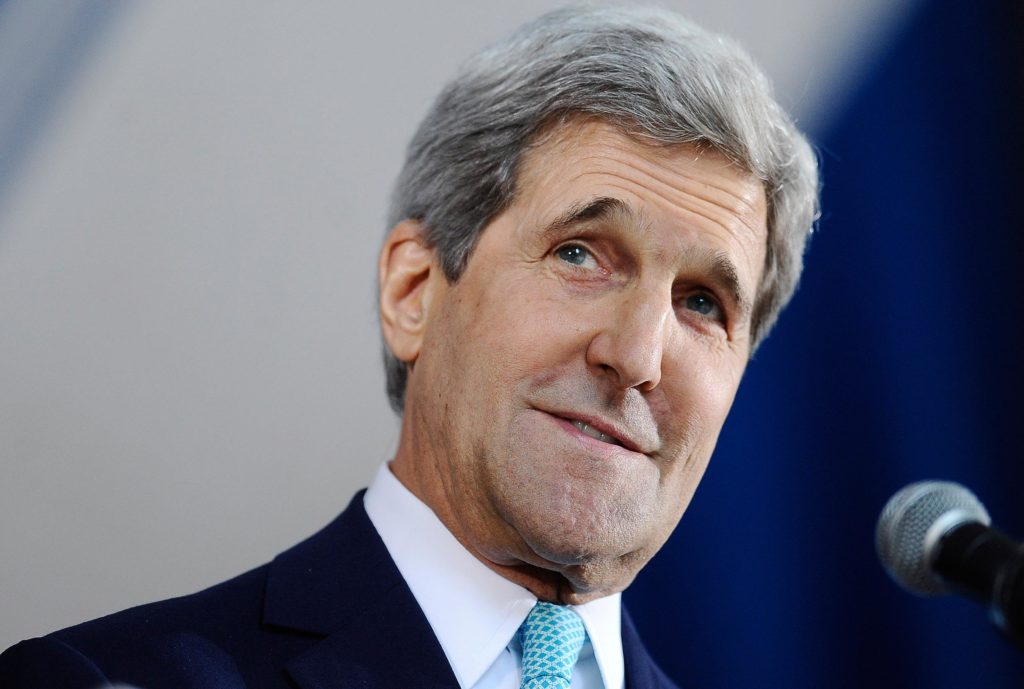
Stepping into a raging diplomatic argument, Secretary of State John Kerry on Wednesday staunchly defended the Obama administration’s decision to allow the U.N. Security Council to declare Israeli settlements illegal and warned that Israel’s very future as a democracy is at stake. Kerry, pushing back on Israel’s fury at the U.S. abstention of the United Nations vote, questioned Prime Minister Benjamin Netanyahu‘s true commitment to Palestinian statehood, which has formed the basis for all serious peace talks for years. Though Netanyahu says he believes in the two-state solution, Kerry said, he’s at the helm of the most right-wing (government) in Israel’s history. “If the choice is one state, Israel can either be Jewish or democratic, it cannot be both, and it won’t ever really be at peace,” Kerry said. Kerry’s speech marked the latest escalation in a vicious, drama-filled row between the U.S. and Israel that has erupted in the last days of Obama’s administration. The extraordinary display of discord between allies – with U.S. and Israeli officials openly disparaging each other – has also pitted President Barack Obama against President-elect Donald Trump, who has firmly taken Netanyahu’s side. Israel’s government was enraged after the U.S. abstained from voting on the U.N. Security Council resolution last week that called Israeli settlements in the West Bank and east Jerusalem a violation of international law. Netanyahu accused the U.S. of colluding with the Palestinians and helping draft the resolution, charges the U.S. has denied. “The United States did in fact vote in accordance with our values, just as previous administrations have done,” Kerry said in a farewell speech at the State Department. “The vote in the United Nations was about preserving the two-state solution. That’s what we were standing up for.” Kerry reiterated that the Obama administration’s commitment to Israel was as strong as that of previous presidents, but he also noted that previous U.S. administrations had also abstained on certain resolutions critical of Israel. He emphasized the record levels of military assistance the U.S. has provided Israel under Obama, codified by a 10-year aid deal recently struck worth $38 billion. “No American administration has done more for Israel’s security than Barack Obama’s,” Kerry said. Obama, who is vacationing with his family in Hawaii, hasn’t commented publicly on the resolution or the resulting spat. Seeking to show he wasn’t focusing exclusively on Israel’s failings, Kerry in the same sentence bemoaned Israel’s “seemingly endless occupation” of Palestinian land and Palestinian leaders’ “incitement” of violence. He invoked the widespread concern that the growing Arab population will eventually make Jews a minority in Israel, creating a democratic crisis for Israel unless there’s a separate Palestinian state. Israeli leaders have made no secret that they are counting on Trump to change U.S. policy, and Trump assured them hours before Kerry’s speech that they just needed to “hang on” til Jan. 20, when he would be sworn in as president. While Trump has not outlined a vision, he has signaled a much more sympathetic approach toward Israel, appointing an ambassador with strong ties to the West Bank settler movement and promising to move the U.S. Embassy from Tel Aviv to Jerusalem over Palestinian and others’ objections. “President-elect Trump, thank you for your warm friendship and your clear-cut support for Israel,” Netanyahu said on Twitter before Kerry’s speech. A senior Israeli Cabinet minister, Gilad Erdan, on Wednesday called Kerry’s speech a “pathetic step,” before Kerry even began speaking. The international community overwhelmingly opposes Israeli settlement construction in the West Bank and east Jerusalem, territories captured by Israel in 1967 and claimed by the Palestinians for an independent state. The Palestinians, and most of the world, see settlements, now home to 600,000 Israelis, as an obstacle to peace. Republished with permission of the Associated Press.
Pressure’s on for Donald Trump to make diplomats safer
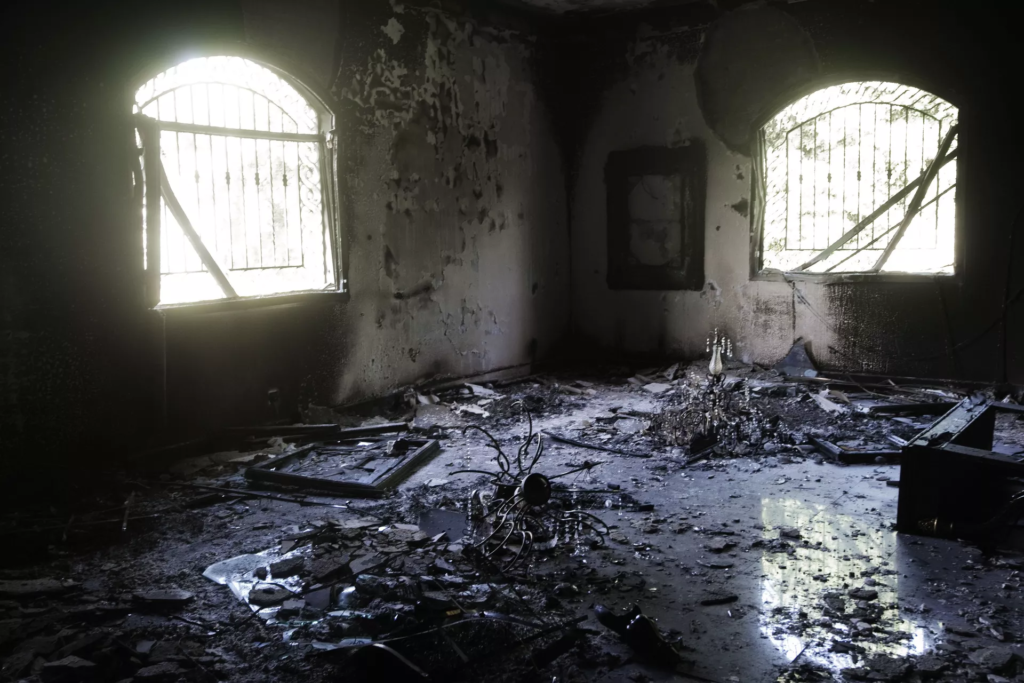
Donald Trump hammered rival Hillary Clinton during the presidential campaign for failing to prevent the attack on the U.S. mission in Benghazi, Libya, when she was secretary of state. Soon he’ll be the one responsible for protecting America’s diplomats, but he’s offered little insight into how he’ll do that. After the 2012 Benghazi attack, Congress boosted spending on security to protect the tens of thousands of Americans and foreign staff that make up the U.S. diplomatic service. Security experts and career diplomats say there have been improvements, but that significant shortfalls remain. Last week’s assassination of Russia’s ambassador to Turkey, Andrei Karlov, was a chilling reminder that diplomats are increasingly exposed to threats, even in countries that are typically not regarded as hardship posts. The assassin shouted, “Don’t forget Aleppo,” apparently referring to Russia’s military engagement in Syria. It’s not clear whether having a brashly outspoken figure like Trump in the White House will compound diplomatic security challenges. The foreign policy of Trump and his pick for secretary of state, Rex Tillerson, remains somewhat of an enigma. The Trump transition team didn’t respond to questions about how his administration will address diplomatic security. Keeping diplomats safe is a costly business. In the last budget year, Congress approved $3.39 billion for the Diplomatic Security Bureau’s functions around the world. That accounts for about 7 percent of the State Department’s overall budget. Diplomatic security has also become highly contentious since the killings of Ambassador Christopher Stevens and three other Americans at Benghazi. The Republican-led House Select Committee on Benghazi concluded in June that there were lethal mistakes by the Obama administration, though it found no “smoking gun” pointing to wrongdoing by Clinton. The committee included Rep. Mike Pompeo, R-Kan., Trump’s pick to head the CIA. Another member of the committee, Rep. Jim Jordan, R-Ohio, criticized the Obama administration for refusing to create the position of undersecretary for diplomatic security. He called it the most important change “to enhance diplomatic security.” He claimed committee Democrats “stonewalled and played games while we searched for the truth.” The top Democrat on the House Intelligence Committee, Rep. Adam Schiff of California, accused Republicans of losing interest in diplomatic security now that the election is over. “Since the issue is no longer a useful cudgel against Secretary Clinton, I fear the (Republican) majority’s commitment to diplomatic security will once again fade, and the State Department could face cuts both to security budgets and to core diplomatic functions,” Schiff said. A 2012 government inquiry following the Benghazi attacks made more than two dozen recommendations for security improvements, highlighting serious lapses in management and leadership that left the consulate vulnerable. The Bureau of Diplomatic Security declined to answer specific questions on the areas where improvement is still needed, but said diplomatic security “constantly balances available resources to provide a safe and secure environment for the conduct of U.S. diplomacy.” Security experts and diplomats say more can be done within individual diplomatic missions to improve safety. Mission security chiefs can use more training, and ambassadors and other mission leaders should also be given greater authority over security matters since they are most familiar with conditions on the ground, experts say. Fred Burton, a former diplomatic security agent and vice president for intelligence at intelligence firm Stratfor, said mission security officials “never had that ability to speak for ourselves at these kinds of decision-making meetings because you’re pushed down on this flow chart and then you’re left … with all the challenges of being in a place like Benghazi.” Burton, author of “Under Fire: The Untold Story of the Attack in Benghazi,” said he’s not optimistic the problem can be fixed unless Tillerson is confirmed “and his desire is to restructure the bureaucracy inside State.” Traditionally, host countries have been obligated by treaty to protect diplomatic facilities. But with non-state actors gaining ground and capable of destabilizing governments, it’s falling to the U.S. to take all precautions to protect its diplomats while still giving them the freedom to do their jobs. Robert Ford, a former ambassador to Syria, said the most helpful way Congress and the administration could advance diplomatic security is by providing “strong support for locally determined security resource needs.” “Security issues cannot realistically be micro-managed from Washington-based officials because only the people on the ground have an up-to-date sense of conditions and the evolution of threats,” he said. Republished with permission of the Associated Press.
US, Russian militaries sharing more information on Syria

U.S.-Russian talks on their separate fights against the Islamic State group are becoming more productive and more frequent, American officials said, with both sides trading information in real time and even outlining some of their strategic objectives in the months ahead. The progress dispels the notion that ties between the former Cold War foes are “frozen.” In the discussions, Russia has made clear its counterterrorism priority in Syria is retaking the ancient city of Palmyra, officials said. The U.S. is determined to pressure IS’ headquarters in Raqqa. The closer contacts between the two countries have developed despite their bitter accusations against each other over the devastation in Aleppo and Moscow’s claim that relations are now “frozen on all practical levels.” The confidential military discussions aren’t focusing on their opposing positions in Syria’s civil war, where Russia is fighting alongside the government and the United States has backed rebel groups, officials said. But U.S. officials with knowledge of the ongoing conversations are crediting both sides with putting aside much of the public animosity, which has included Washington’s accusations of Russian war crimes in Aleppo and Moscow’s charges of American support for terrorist groups such as al-Qaida. Much of the talk has concerned the two nations’ immediate operations. Since Dec. 15, the U.S.-led coalition has conducted airstrikes on about two dozen locations around Palmyra, destroying air defense weapons, tanks, aircraft shelters, storage bunkers and other vehicles and equipment. At the same time, U.S. and Russian officials having been ensuring that the two militaries’ don’t cross paths in the airspace above the city that IS militants seized for the second time earlier this month, and that American strikes don’t mistakenly hit Russian or Syrian forces. But the talks have gone beyond the granular and even touched on broader U.S. and Russian plans, according to several U.S. officials, who weren’t authorized to speak publicly on the confidential discussions and demanded anonymity. The Russians have spelled out that after they retake Palmyra, they want to move on IS militants congregated in Deir el-Zour, a city closer to the Iraqi border. Succeeding in Deir el-Zour, according to one U.S. official, could take Russia several months. Palmyra became a more urgent mission after Islamic State militants ended the Syrian government’s nine-month hold over the city, seizing Russian and Syrian military equipment and weapons in the process. These include dangerous air defense artillery that could be used against coalition and friendly forces. According to officials, the U.S. and Russian militaries have been communicating regularly, often in real time as strikes have been about to launch to make sure innocent troops aren’t at risk. The new concentration of U.S. strikes around Palmyra in the past week has made the effort especially important for Russia, one senior U.S. official said. The scope of the discussions suggests the two sides are pulling back from some of the extreme rhetoric in recent months, mainly colored by Russia’s support for the successful Syrian military effort to retake all of Aleppo. While Russian President Vladimir Putin has expressed hopes that Donald Trump will improve U.S.-Russian cooperation, it appears some of the groundwork already is being done. U.S. officials have legal constraints on how far they can go. American law prohibits any military-to-military relations with Russia in the aftermath of its 2014 annexation of Ukraine’s Crimea region. But as Syria’s various conflicts have escalated, it became more critical for the U.S. and Russia to make sure they avoid crashes and other problems in the increasingly crowded skies – as happened when the U.S. mistakenly killed dozens of Syrian soldiers in airstrikes near Deir el-Zour in September. “We certainly don’t want to have a repeat of that,” said Air Force Col. John Dorrian, spokesman for the U.S.-led coalition in Iraq and Syria. Palmyra poses particular difficulties. Several hundred IS forces are believed to be in the city. But Syrian government and Russian troops are also there, making it difficult to tell them apart. Republished with permission of the Associated Press.
Barack Obama, Japan’s Shinzo Abe decry ‘horrors of war’ at Pearl Harbor
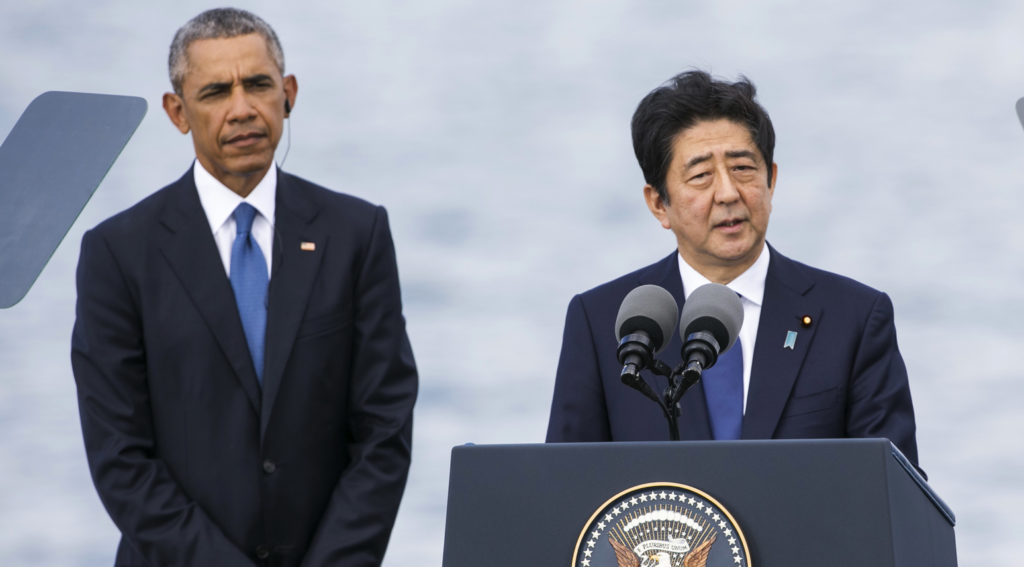
The leaders of Japan and the United States sought to remind the world that even the most bitter enemies can become allies, during a historic pilgrimage to the hallowed waters of Pearl Harbor. Prime Minister Shinzo Abe did not apologize, but conceded Japan “must never repeat the horrors of war again.” Seventy-five years after Japan’s surprise attack, Abe and President Barack Obama peered down Tuesday at the rusting wreckage of the USS Arizona, clearly visible in the tranquil, teal water. In a show of respect for the war dead, Obama and Abe dropped purple petals into the water and stood in silence. More than 1,000 U.S. war dead remain entombed in the submerged ship, which Japan struck as part of the devastating attack that killed more than 2,300 Americans and sent America marching into World War II. “As the prime minister of Japan, I offer my sincere and everlasting condolences to the souls of those who lost their lives here, as well as to the spirits of all the brave men and women whose lives were taken by a war that commenced in this very place,” Abe said later at nearby Joint Base Pearl Harbor-Hickam. That was the closest Abe would get to an apology for the attack. And it was enough for Obama, who also declined to apologize seven months ago when he became America’s first sitting president to visit Hiroshima, where the U.S. dropped an atomic bomb in a bid to end the war. It was enough, too, for Alfred Rodrigues, a U.S. Navy veteran who survived the attack. The 96-year-old said he had no hard feelings and added, “War is war.” “They were doing what they were supposed to do, and we were doing what we were supposed to do,” Rodrigues said before the visit. Abe, who became Japan’s first leader to visit Pearl Harbor with a U.S. president, said the visit “brought utter silence to me.” His remarks capped a day that was carefully choreographed by the U.S. and Japan to show a strong and growing alliance between former foes. Obama and Abe started Tuesday’s activities here with a formal meeting at another nearby military base, in what the White House said was probably Obama’s last with a foreign leader before leaving office in January. It was a bookend of sorts for the president, who nearly eight years ago invited Abe’s predecessor to be the first leader he hosted at the White House. Yet despite the display of unity, there was a point of disagreement the day after about what had happened in the meeting. Japanese officials said that in their talks, Abe and Obama agreed to closely monitor the movements of China’s first and sole aircraft carrier, which has sailed into the western Pacific for the first time. But the Americans on Wednesday said that was inaccurate and no agreement was reached, although they said Obama and Abe did speak briefly about “regional security issues.” Obama, speaking after he and Abe laid green-and-peach wreaths at the memorial, called Pearl Harbor a sacred place and said that “even the deepest wounds of war can give way to friendship and lasting peace.” It’s a notion Obama tried throughout his presidency to put into practice, as he reached out to former adversaries Iran, Myanmar and Cuba. Japanese leaders have visited Pearl Harbor before, but Abe was the first to go to the memorial above the sunken USS Arizona, where a marbled wall lists the names of U.S. troops killed in the Japanese attack. “There’s this sense of guilt, if you like, among Japanese, this ‘Pearl Harbor syndrome,’ that we did something very unfair,” said Tamaki Tsukada, a minister in the Embassy of Japan in Washington. He said he believes Abe’s visit would “absolve that kind of complex that Japanese people have.” In the years after Pearl Harbor, the U.S. incarcerated roughly 120,000 Japanese-Americans in internment camps before dropping atomic bombs in 1945 that killed some 140,000 people in Hiroshima and 70,000 in Nagasaki. Since the war, the U.S. and Japan have built a powerful alliance that both sides say has grown during Obama’s tenure, including strengthened military ties. Yet there are questions about whether the relationship will fray under President-elect Donald Trump, a possibility neither Obama nor Abe addressed. Republished with permission of the Associated Press.
Israeli Cabinet minister calls John Kerry speech a ‘pathetic’
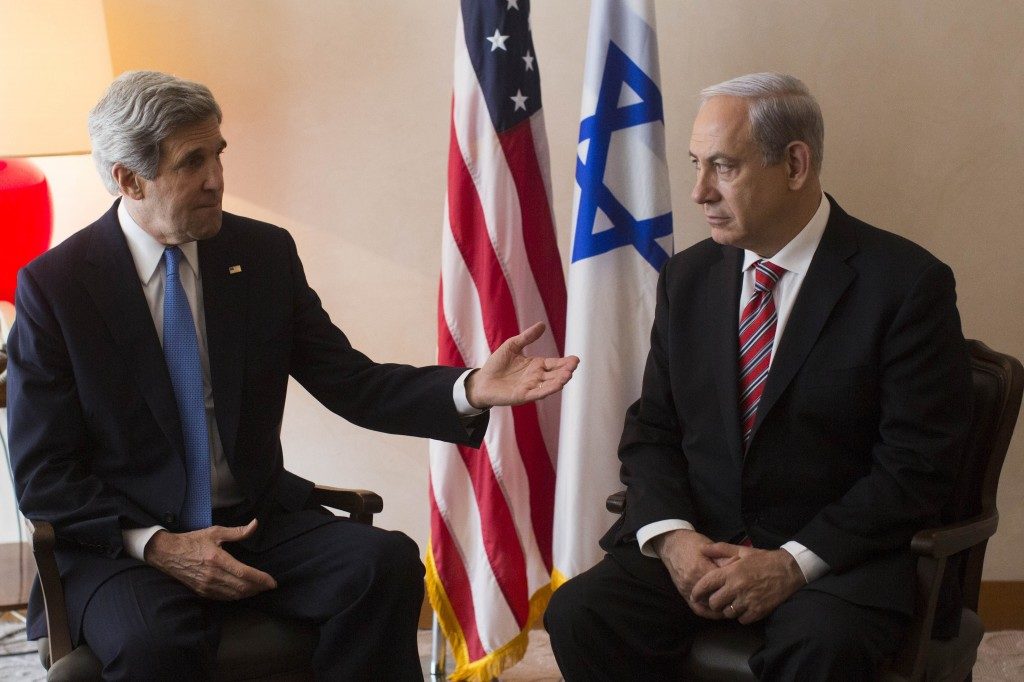
A senior Israeli Cabinet minister on Wednesday called U.S. Secretary of State John Kerry‘s planned Mideast policy speech a “pathetic step,” further heightening tensions between the two close allies as the Obama administration prepares to leave office. The comments by Public Security Minister Gilad Erdan were the latest salvo in a toxic exchange following the U.S.’s refusal to veto a U.N. Security Council resolution last week that called Israeli settlements in the West Bank and east Jerusalem a violation of international law. Israeli Prime Minister Benjamin Netanyahu has slammed the resolution, and accused the U.S. of colluding with the Palestinians in drawing it up. Following up on the U.N. resolution, Kerry was scheduled to deliver a farewell speech in Washington on Wednesday to outline his proposals for a peace settlement between Israel and the Palestinians. Next month, France is set to host an international conference where 70 countries, over Israeli objections, hope to endorse an international framework for Mideast peace. Israeli officials fear that the conference’s recommendations may then be approved in another U.N. Security Council resolution just before Obama leaves office on Jan. 20. In a radio interview, Erdan said Kerry’s speech was part of a broader effort to hinder the incoming administration of Donald Trump, who has signaled he will have much warmer relations with Israel. “This step is a pathetic step. It is an anti-democratic step because it’s clear that the administration and Kerry’s intention is to chain President-elect Trump,” Erdan told Israel Army Radio. Erdan, a member of Netanyahu’s Likud Party and inner Security Cabinet, said Obama administration officials are “pro-Palestinian” and “don’t understand what’s happening in the Middle East.” Kerry mediated a nine-month round of peace talks that broke down in early 2014 with little progress. Israeli leaders have made no secret that they are counting on Trump to change U.S. policy. While Trump has not outlined a vision, he has signaled a much more sympathetic approach toward Israel, appointing an ambassador with strong ties to the West Bank settler movement and promising to move the U.S. Embassy from Tel Aviv to Jerusalem, over Palestinian objections. The international community overwhelmingly opposes Israeli settlement construction in the West Bank and east Jerusalem, territories captured by Israel in 1967 and claimed by the Palestinians for an independent state. The Palestinians, and most of the world, see settlements, now home to 600,000 Israelis, as an obstacle to peace. Netanyahu says the conflict with the Palestinians, including the fate of the settlements, must be resolved through direct negotiations and says that international dictates undermine the negotiating process. Despite the Israeli anger, Netanyahu ordered a Jerusalem planning committee to delay a vote on approving construction of some 500 new homes in Jewish developments of east Jerusalem, a city councilman said. Council member Hanan Rubin told The Associated Press that Netanyahu asked to delay Wednesday’s vote so as not to antagonize relations with the U.S. Meanwhile, a senior leader of the West Bank settlement movement called Kerry a “stain on American foreign policy” and “ignorant of the issues.” Oded Revivi, chief foreign envoy of the Yesha Council, said Kerry is “the worst secretary of state in history,” who “chose to stab his closest ally in the back” and knows little about the realities of Israeli settlements in the West Bank. Republished with permission of the Associated Press.
Analysis: GOP vexed by factions on replacing health law
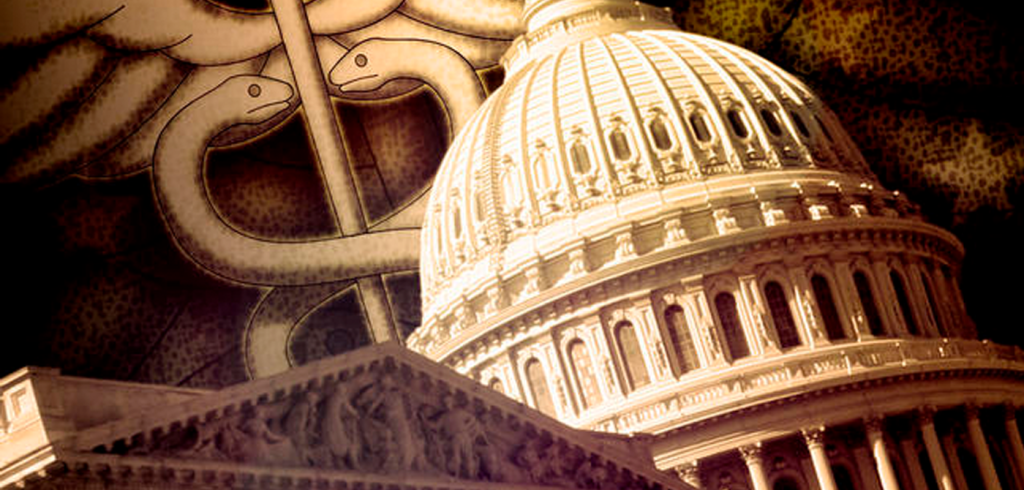
Republicans are united on repealing President Barack Obama‘s health care law, but ideologically and practically speaking, they’re in different camps over replacing it. Getting the factions together won’t be easy. Some Republicans would revise and rebrand “Obamacare,” junking unpopular provisions like its requirement that most Americans carry health insurance, while preserving more popular provisions. Others would rip up the Affordable Care Act, or ACA, and not replace it. President-elect Donald Trump and Republican congressional leaders will have to unite the groups on complicated changes affecting the financial and physical well-being of millions of people. For some constituents in fragile health, it’s literally a life-and-death debate. Republicans have “a really narrow path,” says Grace-Marie Turner of the Galen Institute, a free-market health care research organization. “They’ve got to deal with the politics of this, they’ve got to make sure they come up with good policy, and they also have process challenges.” Success is not guaranteed, and Republicans may come to regret that their party defined itself as totally opposed to “Obamacare.” Yet House Ways and Means Chairman Kevin Brady seems unfazed by the challenge. “It’s like tax reform,” the Texas Republican says, explaining that many pieces will be pulled together. “Unlike Obamacare, which ripped up the individual market, this will be done deliberately, in an appropriate timetable.” Republicans say they will move quickly to repeal the ACA, while suspending the effective date to allow them to craft a replacement. Here’s a look at the GOP camps and who’s in them: REVISE & REBRAND Many Republicans may quietly be in this contingent, but fear being accused of promoting “Obamacare-lite.” They’d strip out some of the ACA’s taxes and requirements. The unpopular “individual mandate” to carry health insurance or risk fines could be replaced with other persuasion short of a government dictate. Rules on insurers would be loosened. But popular provisions such as protecting those with pre-existing health conditions would be retained in some form, as well as financial assistance for low- and moderate-income people. The requirement that health plans cover adult children until age 26 would be fairly easy to preserve, since employers have accommodated it. A rebranded version of Obama’s law may well cover fewer people. But its GOP advocates believe most Americans will find their goal of “universal access” politically acceptable when measured against the Democratic ideal of “universal coverage” underwritten by government. Many GOP allies in the business community favor revising the ACA. That includes major players among hospitals, insurers and pharmaceuticals. Trump may have given this group some cover by saying that he wants to keep parts of the law, but his bottom line remains unknown. BUDGET HAWKS For budget hawks, unwinding the Obama health law is a beginning. Next they could move on to much bigger objectives like restructuring Medicaid and Medicare, and placing a cost-conscious limit on tax breaks for employer coverage. Budget hawks see health care as the main driver of government deficits, and they are loath to address that imbalance by raising taxes. Instead they want to rewrite the social compact so individuals accept more responsibility and risk for their health care. House Speaker Paul Ryan is the most prominent member of this camp, and his “Better Way” agenda is its roadmap. Georgia Rep. Tom Price, Trump’s nominee to run the Department of Health and Human Services, is a budget hawk. Vice President-elect Mike Pence has been in the same orbit throughout his career. The problem for budget hawks is that the 2016 political campaign did not give them a mandate. Issues like Medicare and Medicaid were scarcely discussed. Trump said he wouldn’t cut Medicare, and sent conflicting signals on Medicaid. Many Democrats can’t wait for Republicans to follow the call of the budget hawks. Betting that will backfire, House Democratic Leader Nancy Pelosi is rallying her lawmakers against “attacks on the ACA and Medicare.” THE RIP-IT-UP SOCIETY The most conservative lawmakers want to “pull Obamacare up by the roots as if it never existed,” says Republican political consultant Frank Luntz. That sentiment is embodied by the 40 or so members of the House Freedom Caucus, and it’s probably broadly shared among conservatives. Some do not believe the federal government should be involved in health care, and they couldn’t care less about replacing the ACA. “They would say that Obama’s plan has failed,” said Luntz. GOP leaders may need these lawmakers to advance on replacement legislation; coaxing them to a middle ground might not be possible. Trump calls the ACA “a disaster,” and that’s pleasing to those farthest on the right. It’s unclear if he’d walk their walk. PRAGMATISTS At the core of this small group are legislative veterans who understand the excruciating difficulties of getting major bills to a president’s desk. GOP Sens. Lamar Alexander of Tennessee and Susan Collins of Maine are pragmatists. They may find support from Republican governors who expanded Medicaid under the health law. GOP congressional leaders could gravitate to this camp. The biggest challenge for pragmatists will be to win over some Democrats for replacement legislation. While repealing most of “Obamacare” is possible with a simple majority in the Senate, 60 votes would probably be needed for a replacement. There will only be 52 GOP senators in the coming congressional session. “Republicans need a fancy Rose Garden repeal ceremony…and I expect them to have one,” said Dan Mendelson, CEO of the consulting firm Avalere Health. “On the other hand, there’s 20 million people with health insurance under the ACA, and they don’t want to dump them. There’s no clear path for how to square that conflict.” Republished with permission of the Associated Press.
Steve Flowers: Requiem for Alabama political icons lost in 2016

At the close of every year, my tradition is to acknowledge the passing away of significant political players from the political stage in Alabama. We have lost some Icons from politics in the Heart of Dixie this year. Lucy Baxley passed away in October in Birmingham at 78. She was born on a farm in rural Houston County in the community of Pansy. She went to school at Ashford. After graduation from high school, she went to work at the courthouse in Dothan and worked for Judge Keener Baxley. When Judge Baxley’s son, Bill, got elected Attorney General in 1970, young Bill Baxley asked Lucy to come to Montgomery to be his administrative assistant. Eight years later she and Bill married. She was an integral part of Baxley’s first campaign for Governor in 1978. Bill became Lt. Governor in 1982, then lost again for governor in 1986. Soon, thereafter, Bill and Lucy ended their ten-year marriage. Lucy then began her own career in Alabama politics. She was elected State Treasurer in 1990 and spent eight years in that post. She was a natural campaigner. One of the best one-on-one I have ever seen. She worked the state during those eight years as Treasurer, especially among senior citizen groups. She parlayed that campaign into being elected as the first female lieutenant governor in history. In that 1998 campaign, she coined the campaign phrase, “I Love Lucy.” Her signs were all over the state. Her name identification was so pronounced that her lieutenant governor’s parking space simply said “Lucy.” She was the Democratic nominee for governor in 2002, but lost to Republican Bob Riley. She finished her political career by serving on the Public Service Commission. Lucy loved Alabama and folks loved her. Judge Perry O. Hooper, Sr. passed away in his hometown of Montgomery in April at the age of 91. Judge Hooper’s career paralleled the growth and dominance of the Republican Party in Alabama. He was indeed one of the founding Fathers of the modern Republican Party in the Heart of Dixie. He was a Republican before it was cool. One time when he was state party chairman, Hooper would joke that he could call a meeting of the state GOP in a phone booth. Hooper was a Marine. His lovely wife, Marilyn, was a Montgomery native and they raised four fine boys. As a pioneer Republican, he led the Goldwater landslide of the South in 1964. That crescendo propelled him into the Montgomery Probate Judge office. He was re-elected to that post in 1970; in 1974, he moved to a Montgomery Circuit judgeship. Twenty years later Judge Hooper broke the ice of control that the Democrats and Trial Lawyers had over the State Supreme Court. He became the First Republican Chief Justice of the Alabama Supreme Court. Democrats and Republicans alike noted at his funeral that during his years as a Judge he treated everyone fairly. Jim Bennett was the longest-serving Secretary of State in Alabama history. Jim passed away in Birmingham in August at age 76, shortly after being diagnosed with cancer. Jim was a writer, reporter, State Representative, State Senator and Secretary of State. He became a reporter for the Birmingham Post-Herald after graduation from Jacksonville State. He covered the Civil Rights protests in Birmingham in 1963 and stood next to Bull Conner when he ordered fire hoses turned on protesters, including children. He once told me he interviewed George Wallace, Bull Conner and Martin Luther King in the same day. He ran for and was elected to the state legislature in 1978. We served together in the House. He later moved to the Senate. He was first appointed Secretary of State in 1993. He won the election in 1994 and served two four-year terms through 2003. He is not only the longest-serving Secretary of State, but is also the only one to have been elected as both a Democrat and as a Republican. He was a longtime member of the Jacksonville State University Board of Trustees and was Chairman of the Board when he passed away. Jim Bennett was a true public servant. Have a Happy New Year! ___ Steve Flowers is Alabama’s leading political columnist. His weekly column appears in over 60 Alabama newspapers. He served 16 years in the state legislature. Steve may be reached at www.steveflowers.us.

